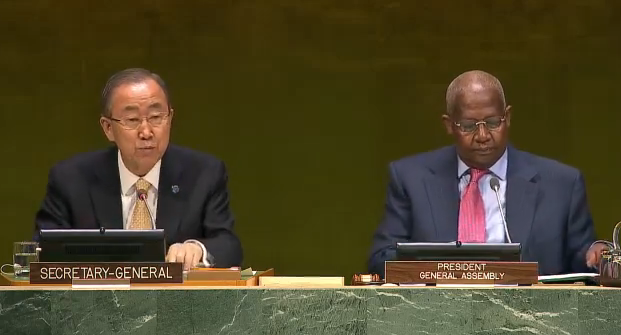 4 December 2014: UN Secretary-General Ban Ki-moon has released an advance version of his synthesis report on the post-2015 development agenda, titled ‘The Road to Dignity by 2030: Ending Poverty, Transforming All Lives and Protecting the Planet.’ In the report, Ban proposes an integrated set of six essential elements: dignity; people; prosperity; planet; justice; and partnership.
4 December 2014: UN Secretary-General Ban Ki-moon has released an advance version of his synthesis report on the post-2015 development agenda, titled ‘The Road to Dignity by 2030: Ending Poverty, Transforming All Lives and Protecting the Planet.’ In the report, Ban proposes an integrated set of six essential elements: dignity; people; prosperity; planet; justice; and partnership.
The UN General Assembly (UNGA) called on the UN Secretary-General, in A/RES/68/6 of September 2013, to synthesize inputs on the post-2015 development agenda in a report before the end of 2014, as an input to the intergovernmental negotiations on the post-2015 development agenda.
In implementing a new agenda, the report recommends: committing to a universal approach with solutions that address all countries and groups; integrating sustainability in all activities; addressing inequalities in all areas; ensuring that all actions advance and respect human rights; addressing climate change drivers and consequences; basing analysis in credible data and evidence; expanding a global partnership for means of implementation (MOI); and anchoring the new compact in a renewed commitment to international solidarity.
Regarding the Open Working Group’s (OWG) proposal on Sustainable Development Goals (SDGs) and targets, the report notes “the possibility to maintain the 17 goals and rearrange them in a focused and concise manner that enables the necessary global awareness and implementation at the country level.” Ban proposes six essential elements to facilitate Member States’ deliberations and enable them to arrive at a concise, aspirational agenda.
On dignity, Ban stresses eradicating poverty as the agenda’s overarching objective, and calls for addressing challenges related to inequality, the rights of women, youth and minorities. On people, Ban recommends addressing, inter alia: education; health; violence against women and girls; and water, sanitation and hygiene (WASH). On prosperity, he calls for inclusive growth that ensures all people have employment, social protection and access to financial services. On planet, the Secretary-General calls for equitably addressing climate change, halting biodiversity loss and addressing desertification and unsustainable land use, protecting forests, mountains, oceans, and wildlife and reducing disaster risk. On justice, the report discusses governance, reconciliation, peacebuilding and state-building. On partnership, Ban describes elements of transformative partnerships that place people, planet and mutual accountability at the center.
Governments must better align financing frameworks, including climate finance, in the post-2015 development agenda, according to Ban. He welcomes policy options presented by the Intergovernmental Committee of Experts on Sustainable Development Financing (ICESDF), and stresses the Third International Conference on Financing for Development (FfD) as critical for achieving “concrete outcomes that would finance sustainable development and set the stage for a successful outcome of the COP21 in Paris.” Further on financing, the report urges Member States to agree to a series of actions, including: all developed countries meeting the 0.7% target on official development assistance (ODA) and agreeing to concrete timetables on ODA commitments, including to Least Developed Countries (LDCs); concessionality levels that take into account different development stages, multiple dimensions of poverty and investment types; adoption of national sustainable development financing strategies; fiscal and macro-economic policies that include low-carbon sustainable development solutions and invest in adaptation and resilience; addressing illicit financial flows; and reducing remittance costs.
On technology, science and innovation, Ban proposes to establish an online, global platform to: “map existing technology facilitation initiatives, needs and gaps, including in areas vital for sustainable development, including agriculture, cities and health;” enhance cooperation; and promote networking, knowledge transfer and technical assistance to scale up clean technology initiatives. Ban calls on Member States to, inter alia: finalize arrangements for the proposed Technology Bank and the Science, Technology and Innovation Capacity Building mechanism for LDCs; scale up cooperation for sharing technologies and strengthening knowledge for innovation capacities; transfer technologies to developing countries; and ensure that global intellectual property regimes are consistent with and contribute to sustainable development.
On data and measurement, Ban recommends developing alternative measures of progress beyond gross domestic product (GDP) and ensuring poverty measures reflect poverty’s multi-dimensional nature. Noting the need for a technical review of goals and targets, Ban states UN technical experts are available to review the targets, including on MOI, which he said could contribute to coherence on FfD. He also suggests Member States consider tasking the UN system with developing a draft set of indicators, and recommends establishing a comprehensive programme of action on data under the UN Statistical Commission (UNSC).
Ban concludes by emphasizing 2015 as a single year with the “unequivocal opportunity and responsibility to adopt sustainable development, to restructure the global financial system in line with our needs, and to respond finally and urgently to the challenge of human-induced climate change,” stressing that such a unique opportunity will not come again. He calls for acting “boldly, vigorously and expeditiously to turn reality into a life of dignity for all, leaving no one behind.”
Ban Ki-moon gave a briefing on the synthesis report to the UN General Assembly on 4 December 2014, which was webcast live. The report will be officially released on 31 December 2014 with translation into all UN languages, and will be formally presented in January 2015. [UN Press Release] [Publication: Synthesis Report of the Secretary-General on the Post-2015 Agenda] [Meeting Webcast] [IISD RS Coverage of Special Event in September 2013] [Twitter Feed about Release of Synthesis Report]